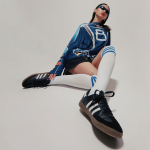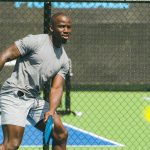The Finish Line saw shares increase 6.8% for the week to close at $36.59 on Friday after another solid quarter that saw earnings, excluding extraordinary gains and charges, jump 72% per share for the fourth quarter and 127% per share for the full fiscal year 2004.
On a GAAP basis, net income for the fourth quarter ended February 28 increased 37% to $21.0 million, or 86 cents per diluted share, versus net income of $15.4 million, or 66 cents per diluted share, in Q4 LY. Excluding the extraordinary gain in last years Q4 from a tornado insurance settlement, EPS in the year-ago quarter would have been 50 cents per share. The full fiscal year 2003 saw benefit from the same gain.
Gross margin in the fourth quarter improved by 210 basis points to 32.0% compared to 29.9% in the year-ago quarter. FINL said 170 bps of the gain came from occupancy costs, 20 bps from merchandise margins and 20 bps due to improvements in shrink. SG&A improved by 100 basis points.
As previously reported in SEW_0410, total sales for Q4 increased 30.2% to $305.3 million from $234.4 million. Comp store sales increased 19% for the quarter on top of a 10% increase reported in the year-ago period. FINL said comps were up 18% in February after gaining 16% in January and 22% in December.
Total year sales were also up 30.2% to $985.9 million from $757.2 million in the previous year. Total year comps were up 20% on top of a 3% gain in the previous year, with Footwear comp sales increasing 16%, and Softgoods posting a 35% increase.
Footwear comp sales results increased 14% in the fourth quarter on top of a 7% gain for the year-ago period. Comps in footwear accelerated as the quarter progressed, increasing 13% in December, 14% for January, and posting a 17% increase for February.
FINL said all segments of the footwear business remained strong as the Men's business posted a mid-single digit comp gain, while women's and kid's footwear both posted double-digit comp gains. Men's footwear in Q4 continued to show strong gains in basketball, running and the active casual departments. The women's footwear increases were led by the running and casual departments.
The company said a strategic focus on premium and exclusive products is bearing fruit as unit sales of shoes priced at $100+ doubled in the quarter, pushing the ASP in footwear up 3% for Q4. FINL cited exclusive collections from Nike, Reebok and adidas, as well as “niche vendors” like K-Swiss and Phat Farm, for driving “sales increases in most categories”. Classics and Nike performance product also showed continued strength.
The average selling price for the current year is expected to rise in the 2% to 5% range from the average of about $55.00 in the 2004 fiscal year.
ASP for fiscal 2004 was basically flat to the prior year, due primarily to increased sales in Womens and Kids that offset much of the ASP gains in Mens product.
Apparel and Accessories comps increased 35% in Q4 on top of an 18% gain for Q4 last year. Comp sales increases in the Softgoods businesses slowed as Q4 progressed, jumping 45% increase in December, 26% increase in January, and a 24% increase in February. Softgoods sales increased 20% for the year to 22% of total sales.
FINL said they still see growth in the license product business “resulting in strong sales increases” in the Men's business and “renewed strength” in the Women's and Kid's apparel business. The gains were driven by strength in Reebok On-Field, Nike Team Sports and Majestic Apparel offerings. Licensed represented about 60% of total apparel sales for the year.
Management said they “continue to anticipate a transition in license from retro and fashion based to more fan-based apparel”. He said he expects the fan-based end of the Licensed business will be about 60% of Licensed sales in fiscal 2005 versus about 50% in the last year.
Branded Apparel sales were led by FINLs private label brand, thanks to an improved inventory position. For fiscal 2004, Branded represented about 25% of apparel sales and Private Label contributed about 15% of sales. Company CEO Alan Cohen said that Branded and Private Label apparel will account for a “greater portion” of the companys softgoods business in the current year. He sees Licensed going to 50% of apparel sales in the current year, with Branded at 30% and Private label growing to 20% of sales.
On the footwear end of the business, Cohen said that about 30% to 40% of product will be “exclusive” product in the current year, a bit more if looking at exclusive colorways, “maybe up to 50% to 60%” of the footwear business.
Finish Lines direct-to-consumer business more than doubled in the fourth quarter and grew 100% for the full year on top of a 200%+ gain in the previous year.
Inventories on a per-square-foot basis increased approximately 12% at year-end compared to 2003 year-end. Aged inventory, or that inventory that is more than a year old, was said to be at a “historically low level of less than 1.0%”.
The company had a net increase of 54 stores in fiscal 2004 to 531 stores at year-end, with the average new store was approximately 4500 square feet. Total square footage increased approximately 9.0% to 3.08 million square feet and is expected to increase at the same rate for the current fiscal year with 60 new stores planned.
March looks to be delivering much of the same positive trends for Finish Line as comp store sales for the first few weeks of the month increasing in the “low double-digits” on top of a 12% comp gain in the year-ago month of March. Cohen said they expect to see continued strength from performance footwear, led by Nike, and a positive impact from color in footwear, particularly in Womens and Kids. He also pointed to renewed strength in Timberland and expects to see an improved boot business this year.
FINL increased its guidance for the current year and now sees diluted EPS in the range of $2.29 to $2.33 per diluted share on sales of $1.119 billion and a 4.0% comp store sales gain.
The fiscal first quarter is now expected to deliver 37 cents to 39 cents per share, up four cents from recent guidance. Sales for Q1 are estimated at $245 million on an 8.0% comp store sales gain. Previous guidance had called for a 5.0% comp gain.














